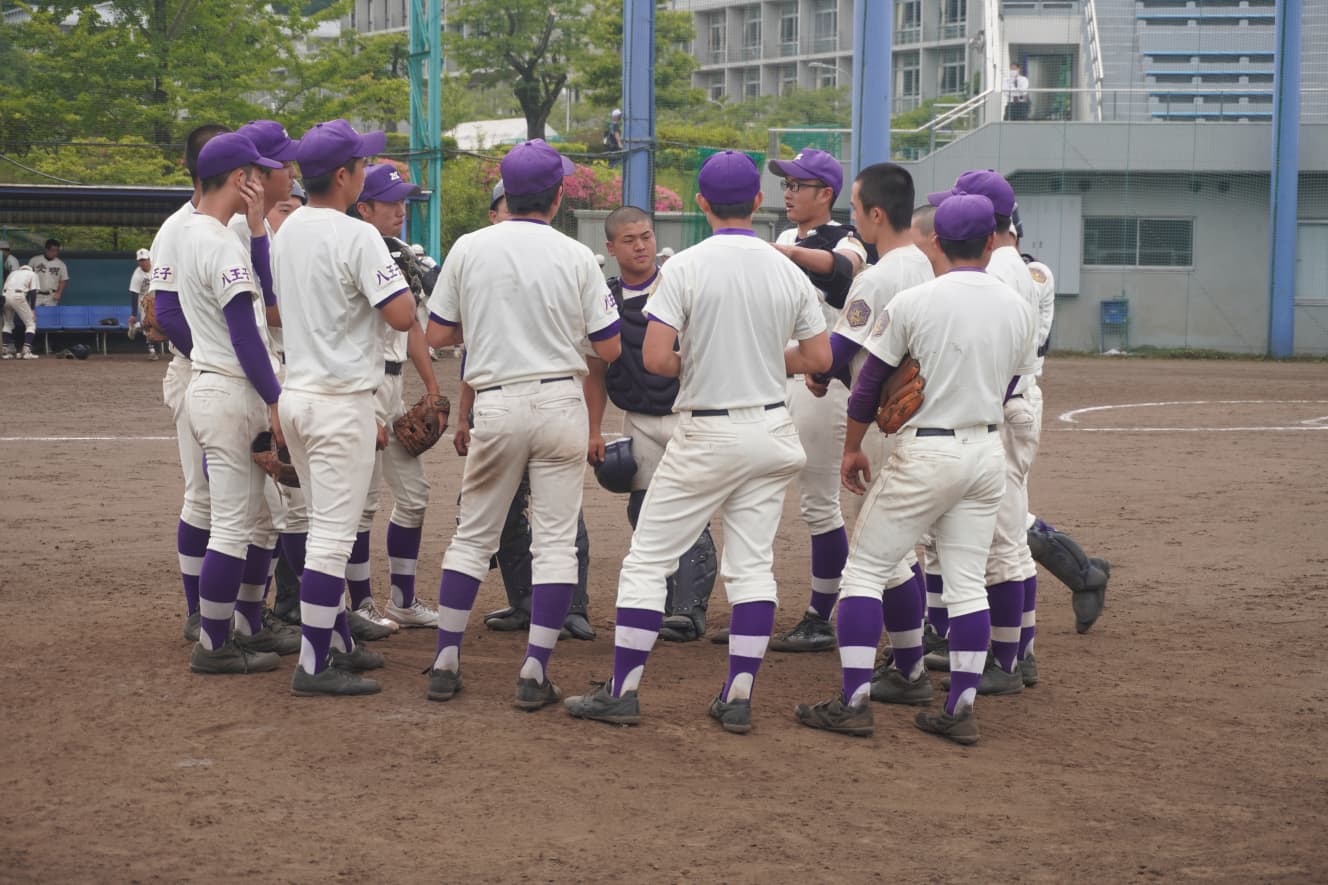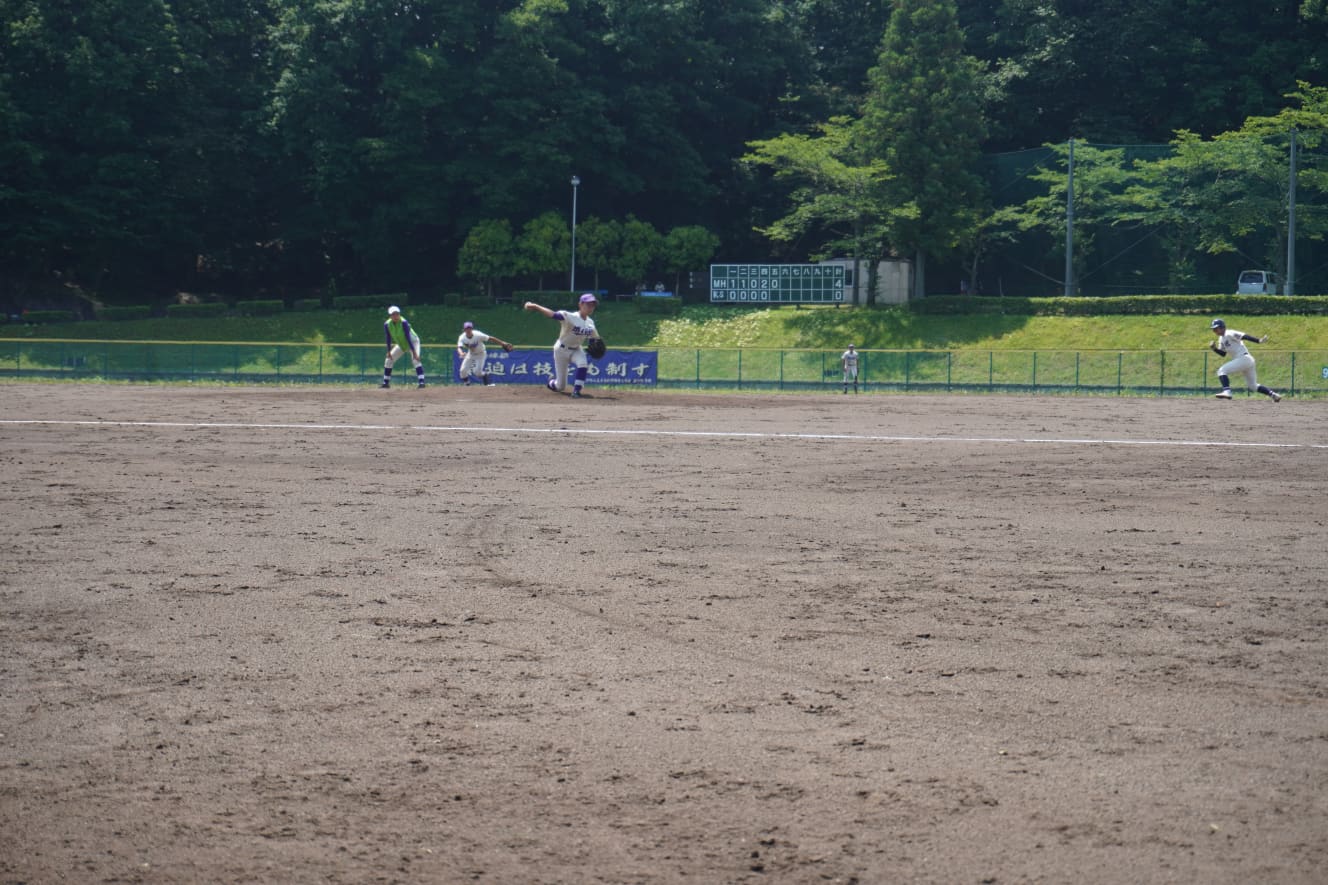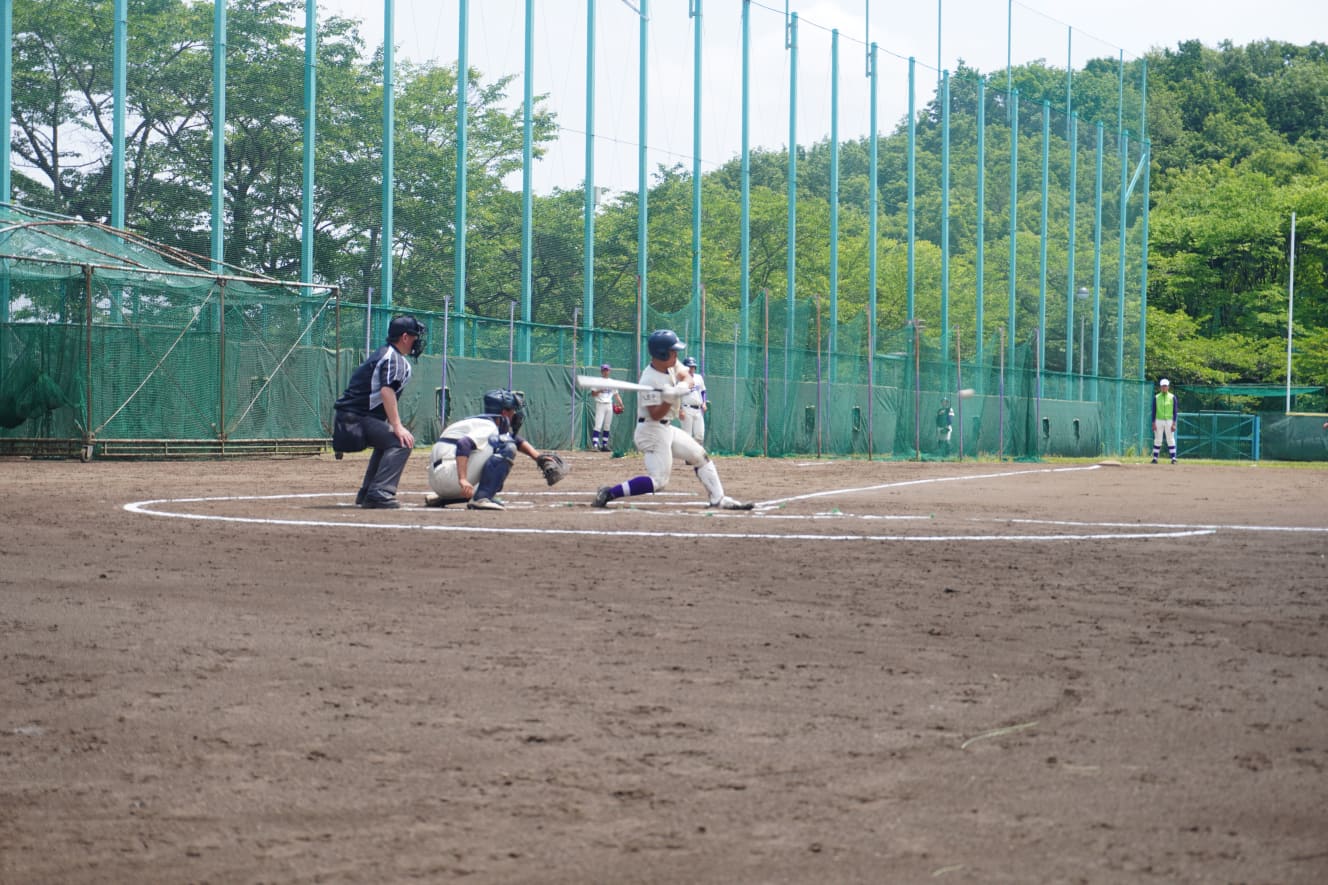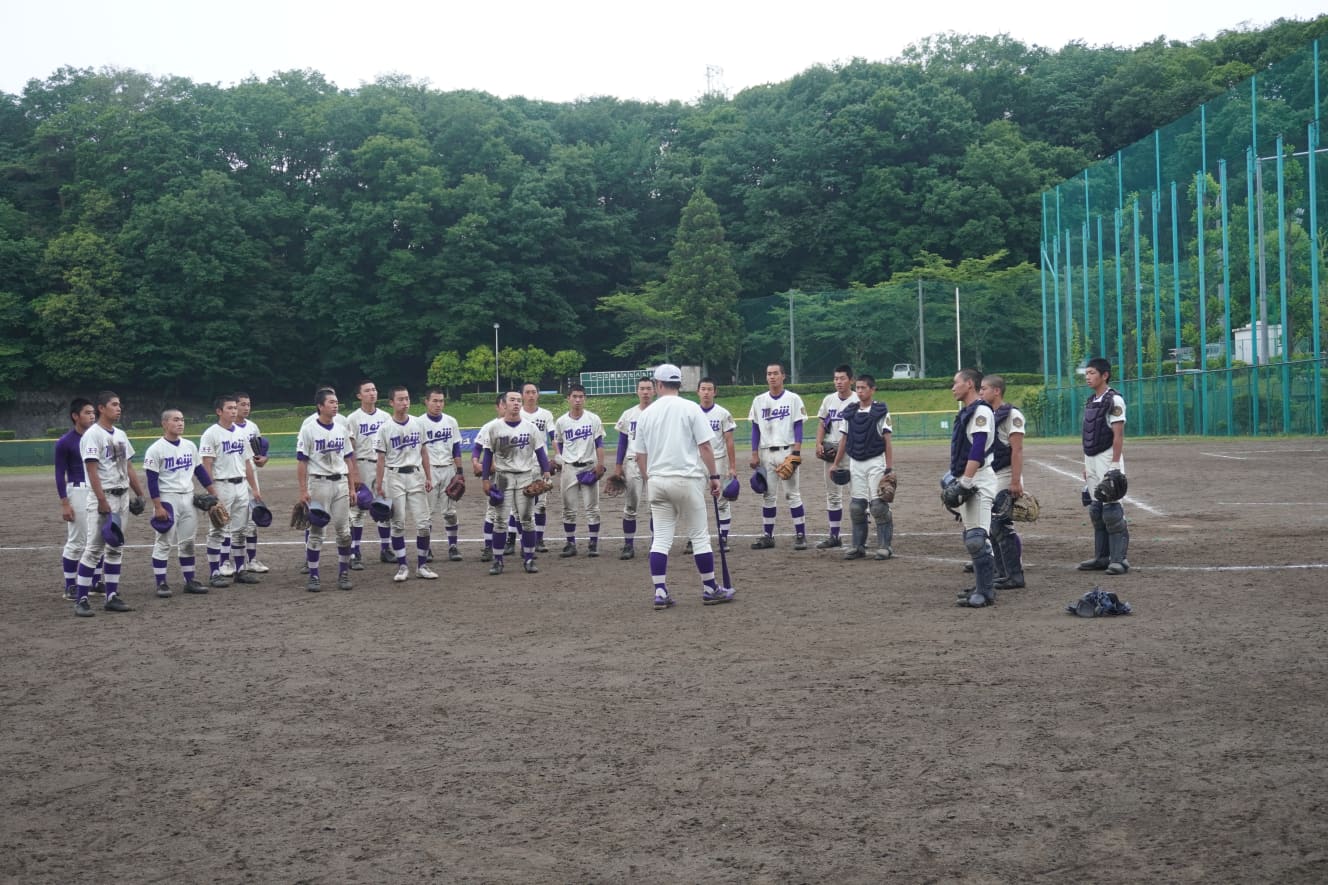The Meihachi Baseball Club, a Preparatory School “Rapid Growth of Prepared Students
The Story of the Meihachi Baseball Club 8: If we win just one game, our opponent will be Tokai University Sugo
He is just one step away from his dream of playing in the Koshien. Despite the restrictions placed on him by his school, which is one of the best preparatory schools in Tokyo, there is a man who still earnestly aims to make it to the Koshien National High School Baseball Championship. He is Takafumi Sugihara, manager of the Meio Nakano Hachioji Baseball Club. This documentary follows his struggles and anguish as well as the physical and mental growth of his students over a period of 270 days.
On July 9, the 104th National High School Baseball Championship Tournament in West Tokyo will kick off.
In selecting the members of the current team to play in the culmination of the tournament, Sugihara Takafumi, the manager of the Meio University Nakano Hachioji High School baseball team, was more worried than ever before. On June 5, the last open game before the team’s roster was decided, a doubleheader against Komyo Sagamihara High School, the students made their final appeal with their hard work. In response, the commanding officer decided on 20 players who could fight with awareness and pride from among 68 players including managers.

It is difficult to decide on the members of the team.
In past years, the team could decide to some extent at the end of May. However, the current team did not allow this to happen. The 20 players who had been decided the night before would not be the best by the next morning. How many times did he repeat such a situation?
Every day, I would look at the data from the open competitions after the spring tournament to finalize the team members, but the next day I would rethink the lineup and find that it was not the same. I was not able to have as many open games as I wanted because of the COVID-19 crisis, and the average number of at bats was about 30. It was difficult to make a decision in such a situation.
In the two games against Komyo Sagamihara High School, there were batting orders in which students who were considered to be in the lineup were lined up in front of and behind each other, and some students had to play under a lot of pressure. Some of the students showed their competitive spirit at the critical moment, while others were not able to show off their presence as much as they would have liked. Some of them might have regretted that they did not have more chances. The deadline for registration was June 17, but Sugihara had no choice but to delay it until the last minute.
In April and May, we were constantly asked what we were going to do with our roles, we were compared relentlessly, and this stress was hard on the students too. They would look down if they didn’t get the results they were looking for. I would tell the students the day they were to present their results, and I wouldn’t want them to procrastinate on their suffering.”
Sugihara usually asks his students for a thorough rationale for their baseball play, words and deeds, so he tells each of the third-year students who are not a member of the team the reason for their exclusion. He never gets used to this painful notice, no matter how many times he gives it. However, because we are serious about each and every one of them, and because we have seen how hard they have worked, we cannot escape from this responsibility. Above all, I hope that they will be able to take the next step forward as strongly as possible.
In the summer, which will be their last, there are many expectations for the third-year students, but it is not a tournament only for third-year students, either. It’s really tough to narrow it down to 20 players.”
Retirement Games Bring the Team Together
On June 15, at the ThreeBond Stadium Hachioji, the team played a retirement game against Hachioji Jissan High School for the third-year students who did not get their numbers.
There, Sugihara was again moved by the essence of baseball and the appeal of high school baseball. He was impressed by the students, who were all vigorous and dynamic, and showed more strength than usual. In particular, Sugihara’s excitement reached its peak when Shogo Okano came to bat in the last inning of the 5-5 game.
I had no hits up to that point,” he said, “but I came in as the first batter and was driven in, but I persevered and finally hit a powerful pitch in front of the center field. He is a student who continued to play baseball while taking a year off from school due to illness, and he showed what he has done by adapting well to his classmates, who are essentially one grade below him. It made me reaffirm that baseball is a sport of feelings. Even in difficult situations, they never give up until the end. They cannot be defeated easily. We will fulfill the responsibility we have been given to bat. The third-year students who joined the team were in the dugout, and the first- and second-year students were all in the stands, but I think there was something that was conveyed to them.”
It was not only the club members who felt it. In the stands were his fellow students of the same age, who had originally been in the same class as him.
He is a popular kid, so everyone came to cheer him on, including Daichi Sanbe, who was the captain, and Hitoshi Inoue, who was the ace. When Okano entered the batter’s box, the clapping became even louder, creating the best atmosphere of the day. It was very moving.”
The game for the third-year students, who would not be able to get out on the field for their final summer, brought the whole team together. The students who were not selected were free to take a break from club activities to prepare for college entrance exams, but they all chose to spend time with their peers.
Thankfully, everyone lends a helping hand every year,” he said. In the past, they have not only assisted us in practice, but if any of the kids showed any slack, some of them would scold us, saying, ‘Why do you have to help this team? Some of the kids would scold me. There is also a child who played a role in data analysis. There are various roles. I want them to find what they can do for the team and contribute on their own.
You make your own place in the team. Even if they are still frustrated at the moment, they will be able to make the most of it no matter what kind of organization they work for in the future.
I don’t want my children to be nothing when baseball is over.
These words show Sugihara’s commitment as a leader.
Meihachi Baseball beats the best by dividing roles
Even though the roles may change, the goal is the same. There is no need for him to be modest with his players. I want the team to do what they can do as the culmination of their high school baseball career.

There is only one seat left for the ace and the No. 4 hitter. However, the team will not function if everyone is aiming for that spot. Immediately after the defeat in the spring tournament, Sugihara wanted the students to rise to the occasion as “players who must be on the team” and “players with individuality. He wanted them to show that they could play this role on the field and help the team win. The students who were able to appeal to this were the ones who remained as members of the team to fight on the ground.
From here, the finishing touches were put on making their individuality stand out.
In order to embody the baseball game that we are good at, in which we all work together as a team, we need to divide up the roles of the players. For example, compared to Nichidai San High School, there is no one who can match them in ability. But last year’s team also brought their competitive game in the spring. Even before that, they had won and lost games against opponents at that level. That is because they did what they had to do. Rather than doing something special, we do what is natural and what we should do carefully. Mistakes are a part of baseball, but if you can minimize them, you can win games. If a mistake is made, someone will make it go away.
We have managed to win because they have been sober, sober, sober, and serious about their roles. The seniors have proven that to us. They don’t look strong, but when they open the door, they are winning. Meihachi is that kind of school, and that is what I have been telling my students.

In the losses in the fall and spring tournaments, as well as in the open competitions that followed, there were many cases where the team made many mistakes and lost without doing what they should have done or without doing what they were supposed to do. Naturally, we have been trying to teach them how to think as a team and what to do, but it is undeniable that we have not been able to devote enough time to them because the ban on club activities due to the COVID-19 crisis has placed a heavy burden on their already limited practice time. However, Sugihara’s eyes were full of energy and he was talking to us.
But Sugihara’s eyes were full of strength, and he was talking to us.
Sugihara has always said, “We are strong in summer” and “We will definitely catch up in summer” without being pedantic.
He has always said, “We are strong in the summer” and “We will definitely catch up in the summer. Teams that are in a mess tend to go up surprisingly quickly. I think it is a good thing to have a sense of crisis. Once we get into official competition mode, the students become more nervous.”
Of course, it is not only the students. Sugihara also seemed to have stepped up his game.
In the second open game on June 5, Sugihara gathered the team members in front of the bench to go over case-by-case tactics during the last inning of the game.
He said, “We hadn’t done enough in terms of setting up the scene, judging the situation, and so on. In the open game, we hardly gave them any signs. We had to leave a lot of things to the players, because it would not be possible if we asked them to play a role when they were trying to find their own individuality and role. So, we often left it up to the players. While assessing them, we only tried to eliminate issues related to team play and organizational issues. But now that the members have been selected, it is time to focus on those areas.
Growth of each of the third-year students
Post-game practice was also full of knockdowns that were in line with the actual game. The team’s decision-making ability was honed as they sorted out the “best,” “minimum,” and “worst” plays in their minds, with detailed settings for scoring margin, innings, runners, out counts, and so on. If a mistake is made, a harsh voice will be heard across the field.
If it was a summer tournament, that would be the end of the third-year high school baseball team!
It was not only Sugihara. The students around him were also chastising him.
“You have to play 100%!
Concentrate!
The students took the initiative in exchanging their opinions on each play, and the scene became heated. Although Sugihara has not stopped shouting, the third-year students, including the captain Shuya Hosaka, are now able to come forward and answer where previously everyone would have remained silent. It was also third-year student Tatsuki Nakamura who followed up on underclassmen who had become unfaithful to their own poor play.
It is hard for me to feel my own growth. However, the students, especially the third-year students, are definitely becoming more dependable.
Can this tension be sustained until the summer tournament?
I asked Sugihara.
He said, “Not yet. We can’t compete in the summer with this kind of atmosphere. Hosaka is the only one on this team who can say that he has experienced the summer of 2009 in the true sense of the word. Summer is not kind. If something unexpected happens and our feelings are shaken, no one can stop us. To prevent that from happening, how much can we anticipate and be nervous from practice? I also want Hosaka to pull me more. When the team is packed with me, I want him to say, ‘Don’t worry, I’ll take care of it. Let’s compete more. He’s got a lot of guts. I’m going to do it for these third-year students! They will think, “I’m going to do it for these third-year students! We have to see how far we can go from here.

If we win one game, our opponent will be Tokai University Sugo.
On June 18, the lottery for the summer tournament was held and the pairings were decided. The first game, the second round, will be held on July 10 against Yingmyoukan High School. If they win, they will face the second seed Tokai University Sugo High School in the next round.
I felt there was something going on because the fall tournament started on Tokai University Sugo’s field, and they were also the team I lost to in the summer finals when I was a senior in high school,” he said. At the same time, I felt that the baseball gods were telling me, ‘Sugihara, make sure you play properly. This combination made me look forward to it.”
Sugihara’s determination was set. The students have been practicing hard, and they are not giving up.
It will be an interesting battle.
Sugihara concluded his thoughts on the final battle with these short words.
(Continue to Part 9)
Cooperation: Fumihiko Washizaki